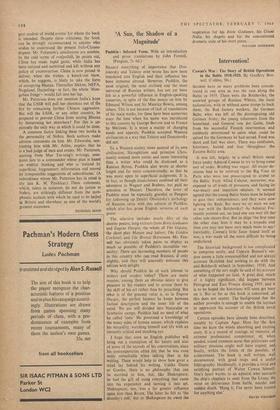Intervention!
Cowan's War : The Story of British Operations in the Baltic 1918-1920. By Geoffrey Ben- nett. (Collins, 30s.)
SELDOM have so many problems been concen- trated in one area as was the case along the Baltic in 1919. There were the Bolsheviks; the assorted groups of Russian Whites; the local nationalists, with or without some troops to back them; the Red factory workers; the German Baits; what was left of the disintegrating old German Army; the young volunteers from the homeland; and General von der Goltz, fresh from his successful Finnish intervention and ruthlessly determined to salve what could be salved for the Germany he had served. Food was short and fuel was short. There was confusion, bitterness, hatred and fear throughout the Eastern Baltic area.
It was left, largely, to a small British naval fotce under Admiral Cowan to try to bring some sort of order. Briefing was vague. All major de- cisions had to be referred to the Big Four in Paris who were too preoccupied to attend to the Baltic. Each Allied Cabinet, moreover, was exposed to all kinds of pressures, and facing its war-weary and impatient electors. It seemed agreed that the young Baltic States must be helped to gain their independence, and they were now fighting the Reds. But were we or were we not at war with the Bolsheviks? As Admiral Fre- mantle pointed out, on land one can wait till the other side shoots first. But in ships 'the first time the other man fires it may be a torpedo and then you may not have very much more to say.' Inevitably, Cowan's little force found itself at war, a war made all the more difficult by being undeclared.
The historical background is too complicated to compress easily, and Captain Bennett's ver- sion seems a little oversimplified and not always accurate (Kolchak had nothing to do with the anti-Bolshevik setback in September, 1918). And something of the sort might be said of his account of what happened on land. A great deal, much of it highly significant, did happen between Petrograd and East Prussia during 1919, and it is to be hoped the historians will soon get busy on it. But as far as this book is concerned. all this does not matter. The background that the author provides is enough to enable the layman to appreciate his account of the British naval operations.
Certain episodes have already been described, notably by Captain Agar. Here for the first time we have the whole absorbing and exciting story. It is a record of courage, of resource, of extreme professional competence; of, when needed, sound common sense that politicians and military missions might well have copied; and finally, within the limits of the possible, of achievement. The book is well written, well documented, with good maps and a useful bibliography. Incidentally, it provides a vivid and satisfying portrait of Walter Cowan himself. One's heart warms to an admiral who instructs the ship's chaplain to omit from the Litany the verse on deliverance from battle, murder and sudden death. 'Hang it, I've never been trained for anything else.'
DAVID FOOT MAN






































 Previous page
Previous page